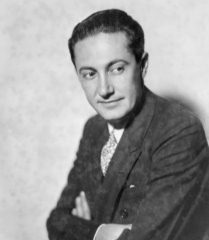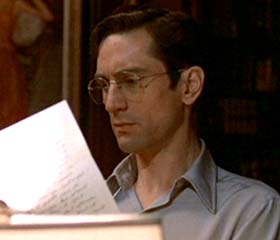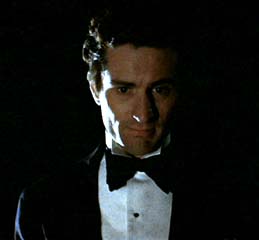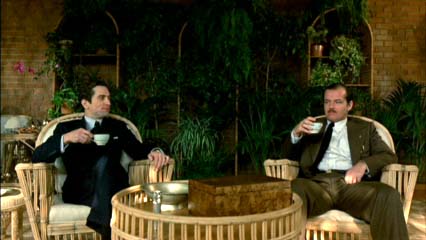|
"It is a tale told by an idiot, full of sound and fury, signifying nothing." - Shakespeare- Well, ol' Billy Shakes might have been watching this very movie when he wrote that line, except that this lifeless film could have used a lot more of that fury he was talkin' 'bout. What's wrong with this sentence? "The Last Tycoon is based on an unfinished novel by F. Scott Fitzgerald." Several things. The most obvious is that the novel was unfinished, and Fitzgerald was changing his mind about how to end it, even thinking about changing what he had already written, so the movie begins by basing itself on an unresolved storyline. That was the least of Hollywood's problems with Fitzgerald's book. The greater issues are as follows:
Fitzgerald's version of the story was basically a roman a clef about the legendary Hollywood producer Irving Thalberg, who had been running Universal at 20, had moved on to head up the operations at MGM by the time he was 25, and was dead of a heart attack by age 37, presumably brought on by overwork. He had been raised in a working-class Jewish family in Brooklyn, had dropped out of high school, and had worked a succession of unimportant secretarial positions before being hired at Universal as a personal secretary. Despite this undistinguished resume, he was running the entire company within a few weeks. Thalberg obviously had to have been an interesting and overwhelmingly talented guy to rise so fast. He was a hands-on manager who could be ruthless in firing directors and writers, but was generally considered to be friendly to artists who had their acts together. If you believe his legend, he had the mind of a businessman, but the soul of an artist. There must have been some truth to that. Despite his workaholic nature, he held on to his marriage with glamorous actress Norma Shearer, and he was greatly admired by the Marx Brothers, especially Groucho, so he couldn't have been a totally humorless corporate drone. Hell, there ought to be a good story in there somewhere, but Fitzgerald never found it. His contribution to the basic Thalberg story was a flight of imagination. Suppose the fictional Thalberg (called Monroe Stahr) had lost Norma Shearer some time before, and had spent the rest of his life seeking to recapture what he had with her. Logically enough, he would notice a young woman who looked exactly like his lost love. As the script imagines it, he noticed her, pursued her, and when he finally got her to agree to meet him, they fell in love. Unfortunately for Stahr, the beautiful woman was already promised to someone else. She resisted his advances at first, but she was overwhelmed by the closeness they developed during the courtship ritual. A relationship developed behind the back of her fiancé. At the same time, her relationship with the fiancé continued behind Stahr's back. Eventually she had to face the music. One afternoon Stahr received a succinct telegram saying "I was married at noon today." The ironic part of the Fitzgerald story is that Stahr could have gotten the girl if he had been as aggressive and decisive with her as he was in his business dealings, but by letting his softer side through and acting passively, he lost his opportunity. The saddest portion of the Fitzgerald narrative is not that Monroe Stahr lost the woman, but that he also lost his studio at the same time. The workaholic had previously been able to stay focused on his job when there was no reason to do otherwise, but when he was concentrating on finding his dream-girl, he started to miss appointments and make business mistakes. When it started to appear that the romance was going to turn out tragically for him, he became obsessed by that and totally lost his grasp on the operation of the studio. In other words, Monroe Stahr's doomed romance caused him to stop behaving like Irving Thalberg and start behaving like F. Scott Fitzgerald. It was easy to understand how Fitzgerald might have projected his life onto Thalberg's. Both men were born just before the new century began. Like Thalberg, Fitzgerald had been highly successful at age 20 (when he wrote Tender is the Night). Like Thalberg, Fitzgerald reached the complete zenith of his profession at 25, when he published The Great Gatsby, one of the most acclaimed novels ever written in the English Language. The lives of the two men took radically divergent paths after age 25, however. Thalberg found the right woman and kept his professional output at the highest level, while Fitzgerald threw his heart into a doomed romantic relationship and not only lost the girl, but also lost his genius and happiness by pursuing her. In other words, to put it bluntly, Fitzgerald wondered what the second chapter of Irving Thalberg's life would have been like if he were not like Irving Thalberg at all, but like F. Scott Fitzgerald. That might have made for a very good film, but this particular film barely touched upon all of that. It seemed to catch it only in passing. I really liked the first thirty minutes of the film, which basically consisted of a look into the movie business. Robert DeNiro is a great actor, and he also looked the part completely. If you look at him quickly, you won't even realize that it is DeNiro. He did one of his famous weight-altering preps for this film. Gaunt, maybe 130-140 pounds, aloof, elegant, spare of gestures and precise of speech, he looked and sounded the spitting image of George Gershwin or Zeppo Marx or any of the many other handsome and intelligent Jewish New Yorkers who became society's darlings in the Jazz Age. DeNiro seemed to disappear, and Monroe Stahr appeared, the completely competent little bantam who seemed to understand every detail of every film on his studio.
|
||||||
|
Once the love story came into the film, however, the movie's energy disappeared. You can't blame DeNiro for that. He conducted his seduction exactly the way that the nerdy Monroe Stahr would have conducted a seduction. DeNiro has never been an especially charming on-screen lover, but his stiff discomfort worked fine in this character. Unfortunately, he was not matched by the woman he was seducing, nor the words they used. Ingrid Boulting was a round-faced model who made her film debut here, and pretty much sang her swan song as well. I hope she was smart enough to keep her day job, because acting was just not her calling. The character was supposed to be a bit daft, like Zelda Fitzgerald herself, but Boulting just seemed very lost and confused and her only facial expression was "deer in the headlights." Miss Boulting was so untalented that she couldn't stay in the industry despite both beauty and connections. (Her father and his twin brother were both prominent producers and directors.) She didn't work in another film for nine years after The Last Tycoon, and her performance in that second film ended her career permanently. That movie, Deadly Passion, was described by a wag at IMDb as "Body Heat with the bodies but without the heat." Ingrid is now long out of show business, still beautiful in her mid 50s, into art and yoga. Here is her personal web site. Ingrid wasn't the only reason the film bombed. Individual scenes seemed to end in the middle, often failing to connect with other scenes. The script was written by the avant-garde minimalist playwright Harold Pinter. If Stahr/Thalberg could have come to life to read this script, he would have fired Harold Pinter and hired two writers, one to give the characters flesh and blood, the other to make the scenes complete and connected to one another. Pinter's oeuvre is mysterious, ominous understatement, which he uses brilliantly in the right context. It didn't work here. Pinter's vague, under-explained scenes just don't belong in a story which should be firmly grounded in reality. Pinter came up with some genuinely loony ideas. At one point, an aging leading man (Tony Curtis) comes into Stahr's office to talk about his impotence. This scene seems to go on forever, and includes memorable dialogue like this:
Ol' Monroe really offered some insights there, eh? The vague dialogue wasn't the worst thing about the scene, nor was the length. The completely frustrating thing was that it had no pay-off. The editor simply cut from the conversation to the waiting room, where other people were queued up to talk to Monroe Stahr. At some point, the people in the anteroom saw Monroe and the actor emerge from the office, shaking hands and laughing, but we have no idea how they got to that point, and their discussion was never mentioned again. In another scene, the head of the studio (Bob Mitchum, playing the Louis B. Mayer character) got a visit from his daughter (Theresa Russell in her screen debut). She remarked that the room was stuffy, and that he should open some windows. At that moment, he was actually opening some windows, so he said that he was opening some windows. Pretty exciting so far, eh? She invited him for a walk; he declined; she insisted. He went to the bathroom to change his shirt, whereupon she snooped around and found a naked woman in his closet. He came out of the bathroom. She said, "cover her up." He was paralyzed, so she covered the woman herself. The naked woman never spoke a single word. This scene has nothing to do with anything that came before or after it in the movie. Other characters besides the naked woman remained complete ciphers. Tige Andrews played a Greek character. I have no idea what his job was in that studio. I just know he was Greek and he didn't like Communists. Ray Milland played a lawyer who always followed Mitchum around. He had no personality other than the personality of Ray Milland, bland though that is. He didn't like Communists either. We don't know why those characters and many others are in the story, and the film would not have lost one thing if they were written out. The same quality of disposability was also true of entire scenes, including the Mitchum and Curtis scenes described above. In Pinter's best plays, the source of menace comes from characters who remain undefined. Pinter is the anti-Tarantino. His thugs don't talk about Big Macs or religion or what they will have for dinner. We don't know where they are from, or their opinions about sports and politics, or what their girlfriends think of them, or when they need to get home. They are there only to provide menace. Their very lack of specificity makes them psychologically terrifying to their victims. That technique works beautifully for Pinter in an abstract drama, but in this kind of semi-biographical and character-based story, we want the characters to be real people. Although the movie industry material doesn't really click, the film might still have been worthwhile if the love story could have shouldered all the heavy lifting for the film, but it could not. The lines Pinter and Fitzgerald wrote for Ingrid Boulting were no better than her ability to deliver them. She is attractive enough that a viewer can understand why Monroe was attracted to her, especially given the resemblance to his dead wife, but it is impossible for the audience to understand why Monroe Stahr still liked her once he talked to her. (Interestingly, Hemingway made similar comments about Zelda Fitzgerald.) Amazingly enough, the director of this film was the formerly brilliant Elia Kazan, one of the most influential people in the development of performance art in the 20th century, a man who directed many great films and plays, and was also the co-founder of the legendary actor's studio. The Last Tycoon was the last film Kazan ever directed, even though he would live another 27 years. It's a shame that Kazan couldn't see that he had the wrong script and the wrong leading lady, because the film had some real strengths. The acting roster must be one of the most impressive ever assembled. I think this is the only film in which DeNiro and Jack Nicholson have a scene together (below). Jeanne Moreau and Anjelica Huston complement the other leading performers already mentioned, and several noted character actors top off the cast.
In addition to the impressive cast, the film has some magnificent cinematography (and the DVD transfer is beautiful). Despite all the plusses, there are so many minuses that The Last Tycoon just doesn't add up to much in the final reckoning. The love scenes have no energy or passion because they occurred between a great actor playing an aloof, stiff guy and a non-actress for whom stiffness would have been a major upgrade from her natural rigor mortis. The non-love scenes, at least those which occurred after the first twenty minutes, seemed to consist of unconnected and/or unfinished anecdotes. The film is a failure, albeit sometimes a magnificent failure. |
||||||
|
||||||




